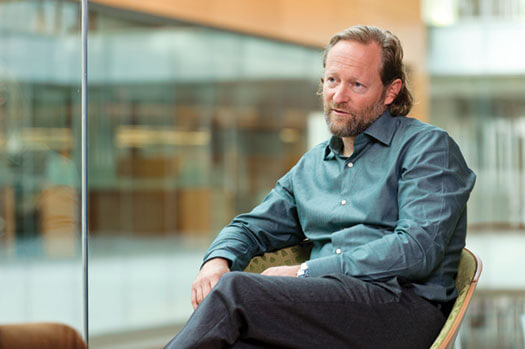David Krakauer
This research institute director’s recipe for success? Collaboration and a dash of humor.
David Krakauer compares the university’s Wisconsin Institute for Discovery (WID) to a greenhouse, a transdisciplinary place to experiment with hybrid ideas not cultivated elsewhere. And while some of these risky ideas may thrive as transplants outside the university, others may not. WID is an environment where success, failure, and learning are all in the mix.
“A lot of our projects may not work,” he says. “If everything we do is playing it safe, I’m probably not doing my job.”
Since taking over in December 2011 as the first permanent director at WID — the public half of a partnership with the privately run Morgridge Institute for Research — Krakauer has focused on building a culture of collaboration that engages creative minds on and off campus, including some unconventional events and programs. For example, a film series kicked off last year with movies about cloning, apocalyptic zombies, and “mad scientists,” exploring the paradox of a culture that is suspicious about science, yet loves movies about the subject. WID is also home to “distinguished scholars,” including Emmy-award-winning travel journalist Peter Greenberg ’72, who helps researchers communicate their work to wider audiences.
You’ve said we need to move into a world where we don’t think about science as an isolated enterprise. How does WID embody that philosophy?
The big picture is that universities and their structures, departments, and disciplines were invented long before we were born, and they were invented to solve problems — many of which have since been solved. In fact, you could argue that many of the big problems, [the] big challenges, are compounded by the structures that we have in place. For instance, we don’t think you can talk about energy without talking about physics, chemistry, economics, sociology, and so forth. That’s really the approach we’re creating here.
What’s the most important thing you’ve learned about breaking down those barriers at the university?
The university is so large and excels in so many areas that it’s not always easy for people with similar interests to connect. What if you could use the university’s enormity and scope to its own advantage? We’re learning that so many people on campus want to collaborate, but don’t necessarily have a place to plug into. We’re trying to be that network for them.
One community leader says you bring both intellectual vigor and humor to WID. Why humor?
One of my advisers in England, a very prominent scientist, once said, “There’s only one reason you do anything, and it’s for fun.” I think humor, a sense of playfulness, allows you to explore possibilities that you couldn’t otherwise. It allows you to challenge authority without being offensive. There’s something in human playfulness that allows you to push at boundaries, and also it just makes you happier. I want to break down [the notion of], “Work is where I’m serious, and home is where I get to play.”
What can a researcher do with WID’s space that just isn’t possible in another campus lab?
At a place like this that is early in the life cycle of research, or ideas, we want to reward collaboration. So we’re trying to make it known to the [campus] community that we want people working together. We’re even building rituals that support that goal. For example, the first thing I did when I arrived was have a tea every day at three [o’clock] that everyone in the building goes to. [Otherwise], you’re in a big building, you don’t see anybody. You go in, you sit in your room, you go to lunch on your own, and then you go back to your room and you go home. That’s not what this is.
What is your dream for WID for five years from now?
Imitation is the most sincere form of flattery, and so we want to measure that. If other universities, other companies, are coming to us and [asking], “How do you build a truly transdisciplinary institute?” — that is success for me, because you’re having an influence, you’re making a mark. Why would they do it? I think they would do it because we’re doing science better than anyone else. We [also] want to crack the science-humanities problem. Success for us would be having those communities working together seamlessly, never referring to themselves as scientists or humanists. In five years’ time, there would be a number of very effective programs, widely emulated, that have changed the way courses are taught on campus, that have engaged business and other academic institutes in our culture. That’s the five-year horizon, and I think we’ll hit it in three.
Published in the Spring 2013 issue



Comments
No comments posted yet.